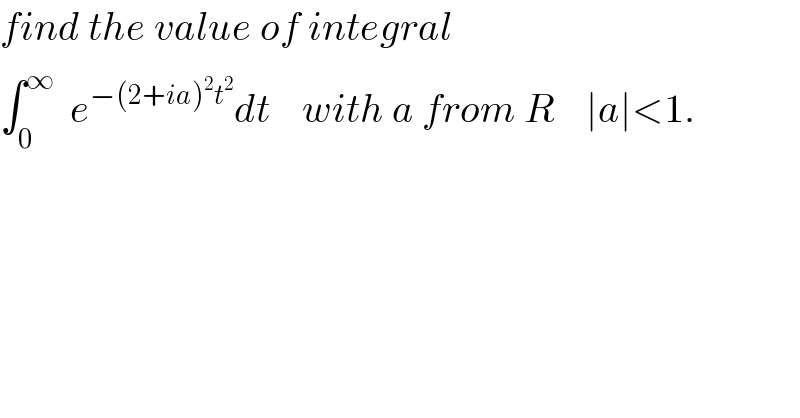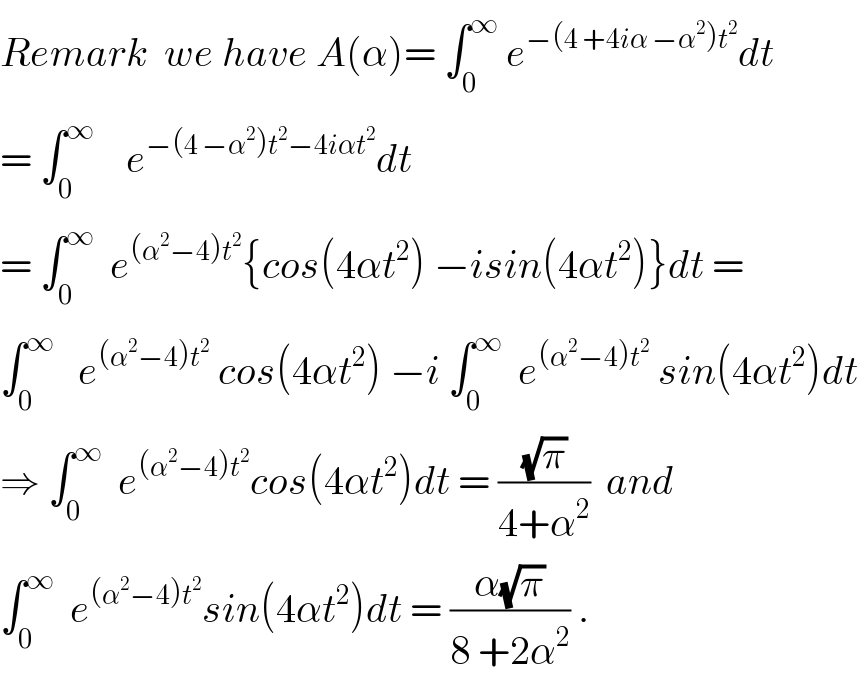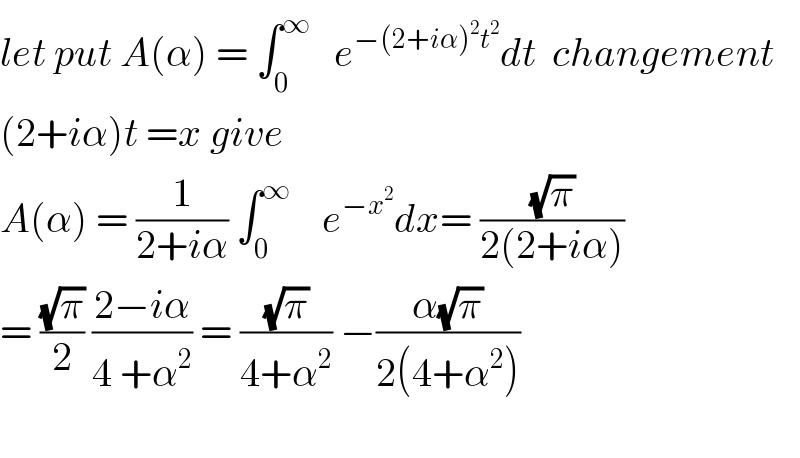
Question Number 35229 by abdo mathsup 649 cc last updated on 16/May/18

$${find}\:{the}\:{value}\:{of}\:{integral} \\ $$ $$\int_{\mathrm{0}} ^{\infty} \:\:{e}^{−\left(\mathrm{2}+{ia}\right)^{\mathrm{2}} {t}^{\mathrm{2}} } {dt}\:\:\:\:{with}\:{a}\:{from}\:{R}\:\:\:\:\mid{a}\mid<\mathrm{1}. \\ $$
Commented byabdo mathsup 649 cc last updated on 17/May/18

$${Remark}\:\:{we}\:{have}\:{A}\left(\alpha\right)=\:\int_{\mathrm{0}} ^{\infty} \:{e}^{−\left(\mathrm{4}\:+\mathrm{4}{i}\alpha\:−\alpha^{\mathrm{2}} \right){t}^{\mathrm{2}} } {dt} \\ $$ $$=\:\int_{\mathrm{0}} ^{\infty} \:\:\:\:{e}^{−\left(\mathrm{4}\:−\alpha^{\mathrm{2}} \right){t}^{\mathrm{2}} −\mathrm{4}{i}\alpha{t}^{\mathrm{2}} } {dt} \\ $$ $$=\:\int_{\mathrm{0}} ^{\infty} \:\:{e}^{\left(\alpha^{\mathrm{2}} −\mathrm{4}\right){t}^{\mathrm{2}} } \left\{{cos}\left(\mathrm{4}\alpha{t}^{\mathrm{2}} \right)\:−{isin}\left(\mathrm{4}\alpha{t}^{\mathrm{2}} \right)\right\}{dt}\:= \\ $$ $$\int_{\mathrm{0}} ^{\infty} \:\:\:{e}^{\left(\alpha^{\mathrm{2}} −\mathrm{4}\right){t}^{\mathrm{2}} } \:{cos}\left(\mathrm{4}\alpha{t}^{\mathrm{2}} \right)\:−{i}\:\int_{\mathrm{0}} ^{\infty} \:\:{e}^{\left(\alpha^{\mathrm{2}} −\mathrm{4}\right){t}^{\mathrm{2}} } \:{sin}\left(\mathrm{4}\alpha{t}^{\mathrm{2}} \right){dt} \\ $$ $$\Rightarrow\:\int_{\mathrm{0}} ^{\infty} \:\:{e}^{\left(\alpha^{\mathrm{2}} −\mathrm{4}\right){t}^{\mathrm{2}} } {cos}\left(\mathrm{4}\alpha{t}^{\mathrm{2}} \right){dt}\:=\:\frac{\sqrt{\pi}}{\mathrm{4}+\alpha^{\mathrm{2}} }\:\:{and} \\ $$ $$\int_{\mathrm{0}} ^{\infty} \:\:{e}^{\left(\alpha^{\mathrm{2}} −\mathrm{4}\right){t}^{\mathrm{2}} } {sin}\left(\mathrm{4}\alpha{t}^{\mathrm{2}} \right){dt}\:=\:\frac{\alpha\sqrt{\pi}}{\mathrm{8}\:+\mathrm{2}\alpha^{\mathrm{2}} }\:. \\ $$
Commented byabdo mathsup 649 cc last updated on 17/May/18

$${let}\:{put}\:{A}\left(\alpha\right)\:=\:\int_{\mathrm{0}} ^{\infty} \:\:\:{e}^{−\left(\mathrm{2}+{i}\alpha\right)^{\mathrm{2}} {t}^{\mathrm{2}} } {dt}\:\:{changement} \\ $$ $$\left(\mathrm{2}+{i}\alpha\right){t}\:={x}\:{give} \\ $$ $${A}\left(\alpha\right)\:=\:\frac{\mathrm{1}}{\mathrm{2}+{i}\alpha}\:\int_{\mathrm{0}} ^{\infty} \:\:\:\:{e}^{−{x}^{\mathrm{2}} } {dx}=\:\frac{\sqrt{\pi}}{\mathrm{2}\left(\mathrm{2}+{i}\alpha\right)} \\ $$ $$=\:\frac{\sqrt{\pi}}{\mathrm{2}}\:\frac{\mathrm{2}−{i}\alpha}{\mathrm{4}\:+\alpha^{\mathrm{2}} }\:=\:\frac{\sqrt{\pi}}{\mathrm{4}+\alpha^{\mathrm{2}} }\:−\frac{\alpha\sqrt{\pi}}{\mathrm{2}\left(\mathrm{4}+\alpha^{\mathrm{2}} \right)} \\ $$ $$ \\ $$
Answered by sma3l2996 last updated on 16/May/18

$${let}\:{u}=\left(\mathrm{2}+{ia}\right){t}\Rightarrow{dt}=\frac{{du}}{\mathrm{2}+{ia}} \\ $$ $${I}=\int_{\mathrm{0}} ^{\infty} {e}^{−\left(\mathrm{2}+{ia}\right)^{\mathrm{2}} {t}^{\mathrm{2}} } {dt}=\frac{\mathrm{1}}{\mathrm{2}+{ia}}\int_{\mathrm{0}} ^{\infty} {e}^{−{u}^{\mathrm{2}} } {du} \\ $$ $$=\frac{\sqrt{\pi}}{\mathrm{2}\left(\mathrm{2}+{ia}\right)} \\ $$
